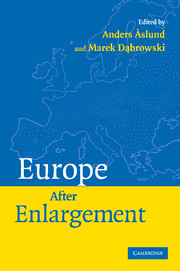Book contents
- Frontmatter
- Contents
- List of Charts, Tables, and Boxes
- Contributors
- Acknowledgments
- Introduction
- 1 Has Europe Lost Its Heart?
- 2 Economic Implications of the Social Provisions of the Stalled EU Constitution
- 3 Fiscal Policy and Fiscal Rules in the European Union
- 4 Design and Implementation of the Stability and Growth Pact: The Perspective of New Member States
- 5 Perspectives on the Lisbon Strategy: How to Increase European Competitiveness
- 6 Is Europe Reforming? Evidence from Cross-Country Structural Indicators
- 7 Recovery Growth as a Stage of Post-Socialist Transition
- 8 Comparative Oligarchy: Russia, Ukraine, and the United States
- 9 The Economic Rationale of the “European Neighbourhood Policy”
- 10 Economic Integration of Eurasia: Opportunities and Challenges of Global Significance
- Index
- References
8 - Comparative Oligarchy: Russia, Ukraine, and the United States
Published online by Cambridge University Press: 04 December 2009
- Frontmatter
- Contents
- List of Charts, Tables, and Boxes
- Contributors
- Acknowledgments
- Introduction
- 1 Has Europe Lost Its Heart?
- 2 Economic Implications of the Social Provisions of the Stalled EU Constitution
- 3 Fiscal Policy and Fiscal Rules in the European Union
- 4 Design and Implementation of the Stability and Growth Pact: The Perspective of New Member States
- 5 Perspectives on the Lisbon Strategy: How to Increase European Competitiveness
- 6 Is Europe Reforming? Evidence from Cross-Country Structural Indicators
- 7 Recovery Growth as a Stage of Post-Socialist Transition
- 8 Comparative Oligarchy: Russia, Ukraine, and the United States
- 9 The Economic Rationale of the “European Neighbourhood Policy”
- 10 Economic Integration of Eurasia: Opportunities and Challenges of Global Significance
- Index
- References
Summary
Introduction
Oligarchs have become one of the big political and economic issues after communism, and one of the biggest policy questions in both Russia and Ukraine is what to do with them. Russia has seen the lawless confiscation of its biggest oil company, Yukos, through taxation, while Ukraine has flirted with widespread re-privatization. The resolution of the problem of the oligarchs will greatly influence the future of the economic systems of these countries.
To design a suitable policy for the treatment of oligarchs, we need to examine what oligarchs actually are, the economic and legal reasons for their emergence, how they act politically, and why they provoke such popular outrage. Our endeavor is to discuss oligarchs as a social phenomenon rather than a moral matter.
Economically, oligarchs have proven highly useful. They are a natural product of large economies of scale and weak legal security, and very large enterprises can hardly develop without them. A major problem is that oligarchs spend inordinate amounts to assure their property rights. The best cure would be to guarantee private property rights to all people, including the oligarchs. If not even the property of the richest is safe, how can anybody trust his or her property rights? Such a guarantee of property rights marks the crossing of the threshold to mature capitalism. Oligarchs may become more palatable politically if they are charged additional taxes or induced to undertake large-scale charitable donations. What must be avoided is the redistribution of property and legal limbo.
- Type
- Chapter
- Information
- Europe after Enlargement , pp. 143 - 164Publisher: Cambridge University PressPrint publication year: 2007
References
- 3
- Cited by

